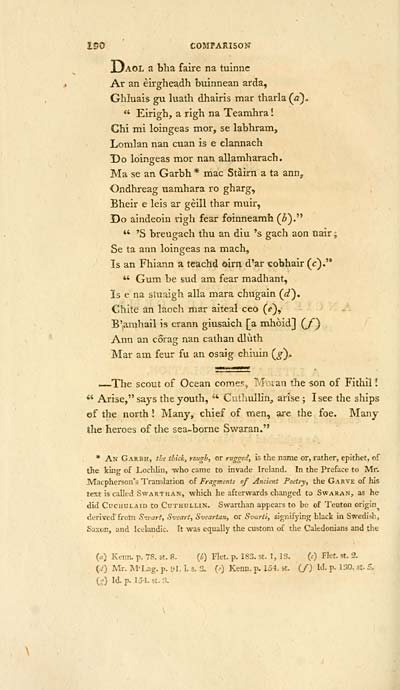Ossian Collection > Report of the Committee of the Highland Society of Scotland, appointed to inquire into the nature and authenticity of the poems of Ossian
(364)
Download files
Complete book:
Individual page:
Thumbnail gallery: Grid view | List view

150 COMPARISON
Daol a bha faire na tuinne
Ar an èirgheadh buinnean arda,
Ghluais gu luath dhairis mar tharla (a).
" Eirigh, a righ na Teamhra !
Chi mi loingeas mor, se labhram,
Lomlan nan cuan is e clannach
Do loingeas mor nan allamharach.
Ma se an Garbh * mac Stairn a ta ann,
Ondhreag uamhara ro gharg,
Bheir e leis ar gèill thar muir,
Do aindeoin righ fear foinneamh (£)."
" y S breugach thu an diu 's gach aon nair ,
Se ta ann loingeas na mach,
Is an Fhiann a teachd ©irn d'ar cobhair (c).'*
" Gum be sud am fear madhant,
Is e na stuaigh alia mara chugain (^).
Chite an laoch mar aiteal ceo (<■),
B'amhail is crann giusaich [a mhòid] (/")
Ann an corag nan cathan dlùth
Mar am feur fu an osaig chiuin Qj-),
—The scout of Ocean comes, M .an the son of Fithil 2
" Arise," says the youth, *' Cnthullin, arise ; I see the ships
©f the north ! Many, chief of men, are the foe. Many
the heroes of the sea-borne Swaran."
* An Garbh, the thick, rough, or rugged, is the name or, rather, epithet, of
the king of Lochlin, who came to invade Ireland- In the Preface to Mr.
Macpherson's Translation of Fragments of Ancient Poetry, the Gar ve of his
text is called Swarthan, which he afterwards changed to Swaran, as he
did Cucholaid to Cothullin. Swarthan appears to bo of Teuton origin^
derived' from Swart, Sveart, Sveartan, or Svarti, signifying black in Swedish,
Saxon, and Icelandic. It was equally the custom of the Caledonians and the
0) Keiin. p. 18. St. S. (I) Flet. p. 183. St. I, 13. (e) Flet. st. 2.
{J) Mr. M'Lag. p. si. 1. b. 3. (■-) Kenn. p. 154. st. (/) Id. p. 130. st- 5.
(;-) Id. p. 154. st. 3.
Daol a bha faire na tuinne
Ar an èirgheadh buinnean arda,
Ghluais gu luath dhairis mar tharla (a).
" Eirigh, a righ na Teamhra !
Chi mi loingeas mor, se labhram,
Lomlan nan cuan is e clannach
Do loingeas mor nan allamharach.
Ma se an Garbh * mac Stairn a ta ann,
Ondhreag uamhara ro gharg,
Bheir e leis ar gèill thar muir,
Do aindeoin righ fear foinneamh (£)."
" y S breugach thu an diu 's gach aon nair ,
Se ta ann loingeas na mach,
Is an Fhiann a teachd ©irn d'ar cobhair (c).'*
" Gum be sud am fear madhant,
Is e na stuaigh alia mara chugain (^).
Chite an laoch mar aiteal ceo (<■),
B'amhail is crann giusaich [a mhòid] (/")
Ann an corag nan cathan dlùth
Mar am feur fu an osaig chiuin Qj-),
—The scout of Ocean comes, M .an the son of Fithil 2
" Arise," says the youth, *' Cnthullin, arise ; I see the ships
©f the north ! Many, chief of men, are the foe. Many
the heroes of the sea-borne Swaran."
* An Garbh, the thick, rough, or rugged, is the name or, rather, epithet, of
the king of Lochlin, who came to invade Ireland- In the Preface to Mr.
Macpherson's Translation of Fragments of Ancient Poetry, the Gar ve of his
text is called Swarthan, which he afterwards changed to Swaran, as he
did Cucholaid to Cothullin. Swarthan appears to bo of Teuton origin^
derived' from Swart, Sveart, Sveartan, or Svarti, signifying black in Swedish,
Saxon, and Icelandic. It was equally the custom of the Caledonians and the
0) Keiin. p. 18. St. S. (I) Flet. p. 183. St. I, 13. (e) Flet. st. 2.
{J) Mr. M'Lag. p. si. 1. b. 3. (■-) Kenn. p. 154. st. (/) Id. p. 130. st- 5.
(;-) Id. p. 154. st. 3.
Set display mode to: Large image | Transcription
Images and transcriptions on this page, including medium image downloads, may be used under the Creative Commons Attribution 4.0 International Licence unless otherwise stated. ![]()
| Permanent URL | https://digital.nls.uk/81753106 |
|---|
| Description | Selected books from the Ossian Collection of 327 volumes, originally assembled by J. Norman Methven of Perth. Different editions and translations of James MacPherson's epic poem 'Ossian', some with a map of the 'Kingdom of Connor'. Also secondary material relating to Ossianic poetry and the Ossian controversy. |
|---|
| Description | Selected items from five 'Special and Named Printed Collections'. Includes books in Gaelic and other Celtic languages, works about the Gaels, their languages, literature, culture and history. |
|---|

